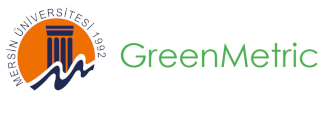Waste Reduce Program
[3] Waste (WS)
[3.1] 3R (Reduce, Reuse and Recycle) Program for University Waste
| d |
| a, b, c, d: Intermediate collection points. Waste personnel regularly collect and correctly sort the waste. |
| d: Separation containers (battery and composite packaging materials) |
| f: Separation containers (paper and glass): Waste containers are located near each building throughout the university. |
| g: Electronic document management system |
| h: Educational posters regarding the university’s 3R policy |
| i: double-sided printer usage policy |
| Examples of 3R Program for University Waste (Mersin University, Turkey) |
Description:
Waste Management at Mersin University:
Mersin University is known for its commitment to environmental sustainability and effective waste management strategies. Here is more information about how Mersin University manage waste:
1. Waste Sources and Types: Mersin University generates various types of waste during its daily operations. These include paper, plastic, glass, metal, organic waste, electronic waste, hazardous waste, and more.
Types of Waste and Sources:
– Paper: Student documents, office papers, brochures (2022 amount: 21 660 kg, waste code:150101).
– Plastic: Water bottles, plastic bags, packaging materials (2022 amount: 16 245 kg, waste code:150102).
– Glass: Glass bottles, window glass (2022 amount: 6 500 kg, waste code:150107).
– Metals: Cans and tin containers, aluminum and steel packaging materials, iron scraps etc. (2022 amount: 8759 kg waste code: 150104)
– Organic Waste: Kitchen waste, garden waste, food scraps (2022 amount: 13170 kg)
– Electronic Waste: Computers, monitors, printers.
– Composite packaging materials: Disposable Coffee Cups, Takeout Food Containers, Plastic-Laminate, Pallets, Chip Bags, Packaging for Electronics (3 791 kg waste code: 150105),
These wastes are properly collected and processed for recycling by the licensed company. By recycling waste, Mersin University contributes to reducing environmental impact as well as saving energy and resources.
2. Waste Collection and Sorting: Waste collection points and separation containers have been established on Mersin University campus. Intermediate collection points and the main collection center are currently under construction. Sorting containers were also purchased by the university. If the construction of the intermediate collection points and the main collection point is completed, these points will make it easier for students, faculty members, staff and institutional buildings to separate waste correctly.
3. Recycling Programs: Mersin University encourages recycling by collecting waste types such as paper, cardboard, plastic and glass and directing them to recycling facilities. Mersin University also has the capacity to use organic waste, namely kitchen waste from dining halls and cafeterias, and agricultural pruning waste from the campus area, for compost (organic soil improvement and chemical fertilizer reduction). For this purpose, there is a compost machine in our university. Thanks to the compost machine, both minimization and recycling of organic waste is achieved.
4. Education and Awareness: Mersin University provides waste management education to students, faculty, and staff. Additionally, they regularly organize awareness campaigns and events.
Mersin University actively participates in waste recycling efforts through a partnership with the Çevdosan Waste Management Company. They’ve strategically placed waste collection boxes across the campus, which serve as collection points for recyclable materials. Furthermore, the university has embraced the nationwide “Zero Waste Project” initiative, emphasizing the importance of recycling all types of recyclable waste.
To support this cause, both students and staff contribute to the recycling process by disposing of their recyclable waste items, including plastic, paper, glass, and aluminum, into designated collection boxes located throughout the campus and offices. Additionally, Mersin University collaborates with the TAPDER organization (Association of Portable Battery Manufacturers and Importers) to collect and properly manage waste batteries.
Approximately 50 tons of waste from the university consists of recyclable materials and all recyclable waste is recycled by ÇEVDOSAN licensed company. Mersin University’s commitment to waste recycling not only contributes to environmental sustainability, but also helps preserve natural resources and promote cost-effective production by supplying sorted paper, plastic, metal and glass to recycling facilities.
Additional evidence link: :
